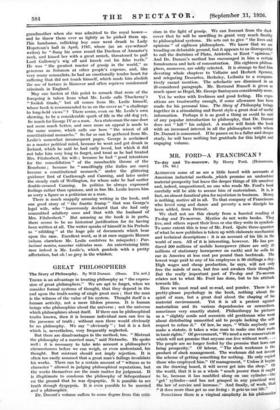GREAT PHILOSOPHERS
The Story of Philosophy. By Will Distant. (Bonn. 25s. net.) THERE is an advantage in treating philosophy as " the expres- sion of great philosophers." We are apt to forget, when we consider formal systems of thought, that they depend in the end upon the truth-seeing of single great men ; that the man is the witness of the value of his system. Thought itself is a human activity, not a mere lifeless process. It is human beings who philosophize about the universe ; not the universe which philosophizes about itself. If there can be philosophical truths known, then it is because individual men can live in the presence of truth ; without men there would obviously be no philosophy. We say " obviously " ; but it is a fact which is, nevertheless, very frequently neglected.
But there are disadvantages in the method, too. " Mistrust the philosophy of a married man," said Nietzsche. He spoke well : it is necessary to take into account a philosopher's circumstances before we can weigh, or even understand, his thought. But mistrust should not imply rejection. It is often too easily assumed that a great man's failings invalidate his works. There can be a certain amount of " witness as to character " allowed in judging philosophical reputations, but the works themselves are the main matter for judgment. It is illegitimate to condemn the philosophy of Schopenhauer on the ground that he was dyspeptic.. It is _possible- to sec truth through dyspepsia. It is even possible to be marrie4 and a philosopher.
Dr. Durant's volume suffers to some degree from this criti- cism in the light of gossip. We can forecast from the dust. cover that he will be unwilling to grant- very much finality to philosophical systems. He sets out to give " the lives and opinions " of eighteen philosophers. We know that we are treading on debatable ground, but it appears to us disrespectful to call the doctrines of Plato, Aristotle, or Kant " opinions." And Dr. Durant's method has encouraged in him a certain formlessness and lack of concentration. His eighteen philoso• pliers, moreover, are oddly selected. It is strange to find him devoting whole chapters to Voltaire and Herbert Spencer, and relegating Descartes, Berkeley, Leibnitz to a compara- tively casual mention. The scholastic are dismissed in an ill-considered paragraph. Mr. Bertrand Russell is given as much space as Hegel, Mr. George Santayana considerably more.
Yet he writes with liveliness and good feeling. His expo- sitions are trustworthy enough, if some allowance has been made for his personal bias. The Story of Philosophy brings together in a stimulating and fluent style a great deal of useful information. Perhaps it is as good a thing as could be said of any popular introduction to philosophy, that Dr. Durant does not " kill " his subject. A reader will finish the book with an increased interest in all the philosophers with whom Dr. Durant is concerned. If he passes on to a fuller and deeper study, he will have nothing but gratitude for this bright and engaging volume.






































 Previous page
Previous page